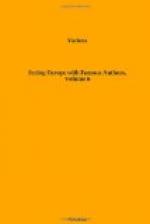It is obviously impossible to dwell at length upon the careers of all these eminent men. As well might one attempt, in a survey on the same scale of English literature, to discuss in detail the careers of all the celebrities of the age of Anne. One can do little more than remark that the list is marvelously strong for a town of some 30,000 inhabitants, and that many of the names included in it are not only eminent, but interesting. Jean Andre de Luc, for example, has a double claim upon our attention as the inventor of the hygrometer and as the pioneer of the snow-peaks. He climbed the Buet as early as 1770, and wrote an account of his adventures on its summit and its slopes which has the true charm of Arcadian simplicity. He came to England, was appointed reader to Queen Charlotte, and lived in the enjoyment of that office, and in the gratifying knowledge that Her Majesty kept his presentation hygrometer in her private apartments, to the venerable age of ninety.
Bourrit is another interesting character—being, in fact, the spiritual ancestor of the modern Alpine Clubman. By profession he was Precentor of the Cathedral; but his heart was in the mountains. In the summer he climbed them, and in the winter he wrote books about them. One of his books was translated into English; and the list of subscribers, published with the translation, shows that the public which Bourrit addrest included Edmund Burke, Sir Joseph Banks, Bartolozzi, Fanny Burney, Angelica Kauffman, David Garrick, Sir Joshua Reynolds, George Augustus Selwyn, Jonas Hanway and Dr. Johnson. His writings earned him the honorable title of Historian (or Historiographer) of the Alps. Men of science wrote him letters; princes engaged upon the grand tour called to see him; princesses sent him presents as tokens of their admiration and regard for the man who had taught them how the contemplation of mountain scenery might exalt the sentiments of the human mind.
Tronchin, too, is interesting; he was the first physician who recognized the therapeutic use of fresh air and exercise, hygienic boots, and open windows. So is Charle Bonnet, who was not afraid to stand up for orthodoxy against Voltaire; so is Mallet, who traveled as far as Lapland; and so is that man of whom his contemporaries always spoke, with the reverence of hero-worshipers, as “the illustrious de Saussure."...
The name of which the Genevans are proudest is probably that of Rousseau, who has sometimes been spoken of as “the austere citizen of Geneva.” But “austere” is a strange epithet to apply to the philosopher who endowed the Foundling Hospital with five illegitimate children; and Geneva can not claim a great share in a citizen who ran away from the town of his boyhood to avoid being thrashed for stealing apples. It was, indeed, at Geneva that Jean Jacques received from his aunt the disciplinary chastisement of which he gives such an exciting account in his “Confessions”; and he once returned to the city and received the Holy Communion there in later life. But that is all. Jean Jacques was not educated at Geneva, but in Savoy—at Annecy, at Turin, and at Chambery; his books were not printed at Geneva, tho’ one of them was publicly burned there, but in Paris and Amsterdam; it is not to Genevan but to French literature that he belongs.




